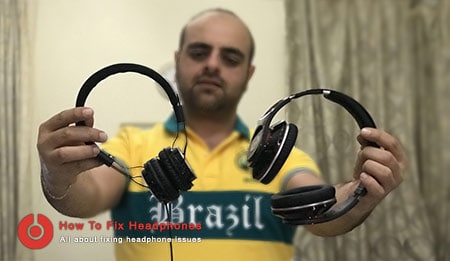
Yes, wired headphones are more reliable than wireless audio transmission, as wireless headphones’ connection might drop from time to time, as well as it is much more dependent on batteries compared to wired headphones which don’t.
Wired headphones provide better sound quality than wireless headphones. With well-trained ears, they can detect even slight differences in sound quality.
This is why they both prefer wired headphones over wireless. Wireless earphone technology has improved dramatically in recent years. But nothing beats the sound quality of wired headphones.
Table of Contents
So, Is Wireless Audio Transmission Not Reliable As Wired Headphones?
Let’s discuss the differences in 5 different aspects:
[1] – Sound Quality
Wired and wireless headphones are useful in different ways depending on the specific needs of the customer.
Many music experts and enthusiasts still believe that wired headphones sound more realistic and accurate than wireless headphones.
Wired headphones, on the other hand, can handle up to 2,304kbps. This number depends on the power/radiation ratio of the gadget used to deliver the signal.
So, quality-wise, wired headphones offer better sound quality than wireless headphones. Most audio files are only 256kbps.
[2] – Compatibility
Headsets, whether wired or wireless, must first be compatible with various audio devices. You can choose headphones with this function for listening to music or talking on the phone.
For example, connecting a 3.5mm cable to an iPhone 7 requires a separate adapter. This phone does not have a headphone jack. If you don’t have the right adapter, you can’t use it.
Connect your sound system to one end of the cable and headphones to the other end. Only then can the goal be achieved. Meanwhile, wireless technology allows you to connect your headphones to most Bluetooth-enabled gadgets.
Many headphones are compatible with the latest Bluetooth versions and may be compatible with older Bluetooth devices.
so, compatibility-wise, wireless headphones have wider compatibility with audio devices.
[3] – Portability
Both the Wired and wireless headphones are portable. Users can carry them along with any baggage. However, some high-quality headphones require a safe place to prevent them from falling to the ground.
Make sure, both options can be heavy or light. Shipping wired headphones require wrapping the cable or wire.
Wireless headphones have some benefits over wired headphones, such as being able to listen to music without the need for cables.
However, wired headphones generally sound better and do not need to be charged before use. Wireless headphones have obvious advantages over wired headphones in certain applications.
Measure and compare compatibly wired and wireless headphones and some models with wired and wireless versions.
[4] – Signal Encoding / Decoding
The Wireless transmission from the source device to your headphones is controlled by a codec. It converts digital audio data into a certain format and back again.
On the other hand, wired headphones use an analog signal that transfers the original audio signal from the device to your ear directly, hence ensuring the best audio quality experience.
The Path a sound takes to reach your wireless headphone
Media Player > AMP > Coder (Digital To Analog converter) lossy > …. Bluetooth Medium …. > Wireless Headphone > Wireless receiver > Decoder (Analog To Digital Converter) lossy > Your Ear
The Path a sound takes to reach your wired headphone
Media Player > AMP > Wired Headphone > Your Ear
Here, wired headphones win.
[5] – Connectivity
Most wireless headphones and earbuds connect via Bluetooth wireless technology. There’s also a ‘shortcut’ way to connect via Bluetooth, called NFC (Near Field Communication), which makes the process even easier.
NFC Technology With Headphones: Good or Bad?
The quickest answer is to link your headphones more quickly. The Bluetooth pairing process isn’t the fastest, despite the fact that it provides a dependable, long-range connection. NFC is useful in this situation.
However, NFC’s drawbacks include the following:
- It only functions at shorter distances.
- It provides slow information transfer rates.
There are other connectivity options (see details below), but for almost all of them, we recommend connecting via Bluetooth or NFC.
[1] – Latency
Latency has a greater impact on your listening/viewing experience when comparing the reliability of wired and wireless headphones. Since wired connections do not have the extra steps of encoding, transmitting, and decoding data packets, they have virtually lag-free audio playback compared to Bluetooth headphones or speakers.
[2] – Range
The range is one of the advantages wireless headphones have over wired ones. You can listen to your music or podcasts when your audio source is in another room, which isn’t always the case with wired headphones. Some studio headphones come with longer cables, but at most, they reach 10-11 feet, which is still well below the range of the worst-performing Bluetooth headphones we’ve tested at 23 feet.
While wired headphones don’t use all of that, they simply use the original analog signal directly as I mentioned in the previous point.
Wired headphones win again and it is more reliable than wireless headphones.

Related Questions
Are Wireless Headphones As Good As Wired Ones?
Both have advantages and disadvantages in detail:
Advantages of Wireless Headphones:
- Since wireless headphones have fewer cables, they come with replaceable cable options, so you don’t have to worry about tangled cables.
- That said, advances in wireless technology have made the loss of sound quality less noticeable than high-quality wireless headphones.
- Wireless headphones tend to last longer than wired ones.
Advantages Of Wired Headphones
- Wired headphones are very easy to use and do not require technical experience or initiate a Bluetooth connection. Just select a playlist, connect it and that’s it.
- Wired headphones can be played on older devices. And you don’t have to worry about signal dropping or disconnection with wireless headphones.
- Also, wired headphones won’t draw much power from your smartphone or MP3 player. However, using wireless headphones wears out the device very quickly.
Disadvantages of Wireless Headphones:
- Wireless is also a bit more expensive.
- You may also face a situation where the wireless connection drops from time to time. This could be due to areas that are losing and interrupting wireless connections.
- However, they are usually very small. In most cases, the headphones will automatically reconnect after a signal loss.
Disadvantages Of Wired Headphones
- Wired Headphone cables get tangled.
- Over time, many wired headphone failures are due to complications from damaged cables. This can be fixed, but it’s a drawback wireless headphones avoid.
| Wireless Headphones | Wired Headphones |
| Free of cables | Wires get tangled |
| Bluetooth compatible | Not compatible with Bluetooth |
| Batteries required | No Batteries required |
| High Price | Low Price |
Are Wireless Headphones Worse Than Wired?
Depending on the quality of the music, wireless and wired headphones may not make much of a difference, but the ALAC or FL / WAV volume settings will likely make a difference.
It is generally believed that wired headphones filter out sound better than wireless headphones.
- Batteries are inconvenient and wasteful:
As battery technology improves, there will inevitably come a time when a cell will stop charging. In this case, you should be able to replace the battery, but few headphones do.
At this point the headphones are dead. Wired models don’t unless the headphones have an active noise canceling unit.
- Expensive:
Barring the headaches that come with charging that damn thing, Bluetooth headsets are generally very useful.
But if you pay $ 50- $ 100 more for the same pair of headphones and the wired version works just fine. Recommend that you save some money to spend on something better.
Conclusion
I’ve shared a comparison of wired and wireless headphones for audio transmission, both of which have many advantages and disadvantages.
If you are looking for a headset with good sound quality, the wired option is a good choice. On the other hand, if you want to keep your music alive, a wireless headset is ideal.


